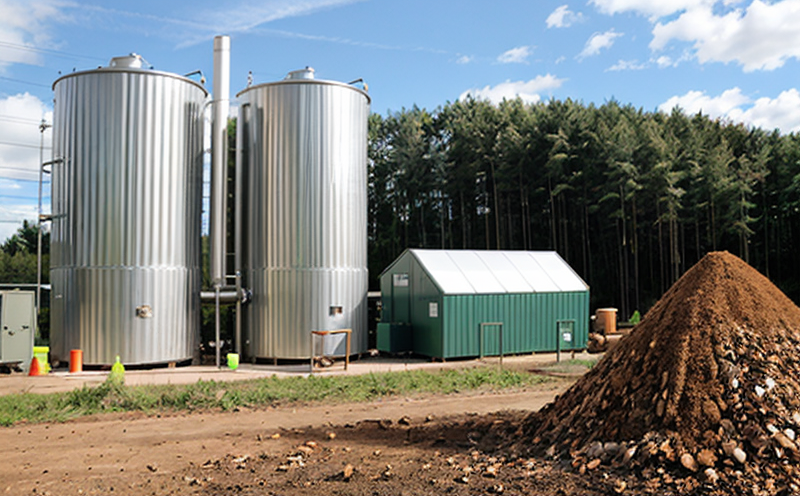ASTM E873 Moisture Content of Biomass Fuels
The ASTM E873 standard provides a method to determine the moisture content in biomass fuels, which is critical for optimizing waste-to-energy processes and ensuring consistent fuel quality. This service ensures that biomass materials are properly prepared before conversion into energy sources, thereby enhancing efficiency and reducing costs.
Biomass is an essential resource for generating renewable energy through various methods such as combustion, gasification, pyrolysis, or anaerobic digestion. The moisture content of biomass fuels significantly influences their calorific value, combustion behavior, and overall performance in waste-to-energy systems. High moisture levels can lead to increased fuel costs due to the need for additional drying processes, while low moisture content may reduce the efficiency of energy production.
The ASTM E873 method is designed to measure moisture content by gravimetric analysis, which involves drying a known mass of biomass sample and reweighing it after achieving a constant weight. This process provides accurate results that can be used for quality control and compliance with regulatory standards. By leveraging this standardized approach, laboratories ensure precise measurements that contribute to more reliable energy production.
Our team of experts utilizes state-of-the-art equipment and techniques to perform ASTM E873 testing according to the specified procedures outlined in the standard. We understand the importance of accurate moisture content analysis for biomass fuels and are committed to delivering high-quality results that meet or exceed customer expectations.
The accuracy of ASTM E873 testing is crucial for several reasons:
- It ensures compliance with international standards and regulatory requirements.
- It supports the development and optimization of waste-to-energy processes.
- It helps minimize operational costs associated with inefficient fuel use.
- It promotes sustainable practices by optimizing resource utilization.
In summary, ASTM E873 moisture content testing plays a vital role in the quality assurance of biomass fuels used in energy production. By adhering to this standard, laboratories can provide reliable and consistent results that contribute to efficient waste-to-energy operations and environmental sustainability.
Scope and Methodology
| Aspect | Description |
|---|---|
| Biomass Sample Preparation | The ASTM E873 method requires that the biomass sample be prepared by drying it to a constant weight at 105°C ± 2°C, then cooled in a desiccator before weighing. |
| Instrumentation and Equipment | Test equipment includes an analytical balance capable of measuring masses up to 1 g with a sensitivity of not less than 0.1 mg. |
| Reagents | No specific reagents are required for this test, but distilled water should be used if any sample is rinsed prior to drying. |
| Test Procedure | The dried sample is weighed accurately and then placed in a pre-weighed oven-drying dish. The dish containing the sample is dried at 105°C ± 2°C until constant weight is achieved, which typically takes around one hour. |
| Calculation of Moisture Content | The moisture content is calculated using the formula: Moisture Content (%) = [(Wet Weight - Dry Weight) / Wet Weight] × 100. |
This table outlines the key aspects of ASTM E873 testing, including sample preparation, instrumentation, reagents, test procedure, and calculation of moisture content. Each step is critical for obtaining accurate results that reflect the true moisture content of biomass fuels.
Environmental and Sustainability Contributions
The ASTM E873 standard plays a significant role in promoting environmental sustainability by ensuring that waste-to-energy processes are conducted efficiently. By accurately measuring the moisture content of biomass fuels, laboratories can help reduce energy consumption and greenhouse gas emissions associated with inefficient fuel use.
Efficient waste-to-energy systems contribute to a circular economy by converting waste materials into valuable resources. The accurate measurement of moisture content enables operators to fine-tune their processes, thereby maximizing resource utilization and minimizing environmental impact.
In addition to reducing operational costs, the ASTM E873 method supports sustainable practices by promoting the use of renewable energy sources derived from biomass. This approach helps mitigate reliance on fossil fuels, contributing to a cleaner environment and reduced carbon footprint.
By adhering to international standards like ASTM E873, laboratories play a crucial role in advancing waste management and recycling initiatives. These efforts contribute to broader sustainability goals, including the reduction of waste sent to landfills and the promotion of renewable energy solutions.
Competitive Advantage and Market Impact
The ASTM E873 moisture content testing service offers significant competitive advantages in the waste management and recycling sector. By providing accurate and reliable results, laboratories can help their clients meet regulatory requirements and optimize energy production processes.
Accurate moisture content measurements enable operators to fine-tune their processes, thereby improving efficiency and reducing costs. This capability enhances a laboratory’s reputation as a trusted partner in the waste-to-energy industry, fostering long-term relationships with clients.
In addition to supporting sustainable practices, ASTM E873 testing contributes to market competitiveness by ensuring product quality consistency. Consistent quality ensures that biomass fuels meet or exceed customer expectations, which is particularly important for those seeking compliance with international standards and regulatory requirements.
The ability to provide accurate moisture content data also enhances a laboratory’s credibility in the marketplace. Clients can rely on these results when making decisions regarding fuel procurement, process optimization, and waste management strategies. This trust fosters loyalty and repeat business, contributing to sustained growth and market leadership.





